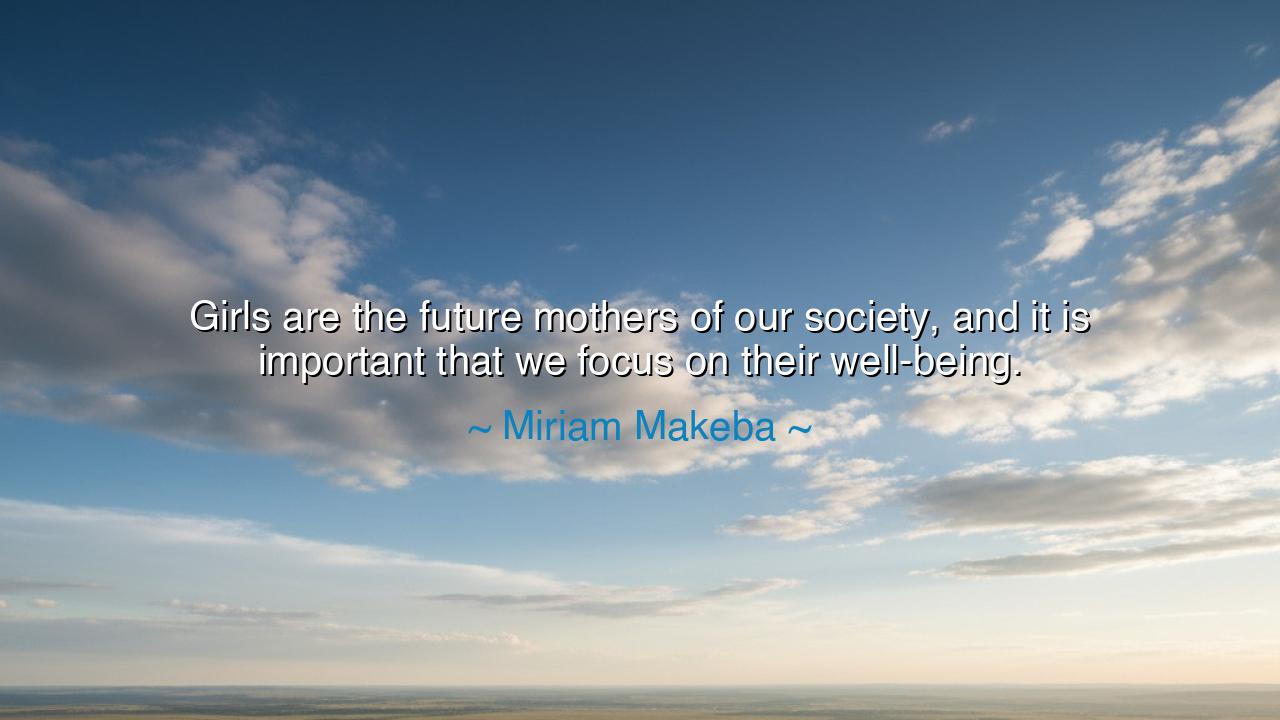
Girls are the future mothers of our society, and it is important
Girls are the future mothers of our society, and it is important that we focus on their well-being.






“Girls are the future mothers of our society, and it is important that we focus on their well-being.” – Miriam Makeba
Hear now the voice of the wise woman, Miriam Makeba, whose words carry the strength of mountains and the tenderness of a mother’s song. In this sacred utterance, she calls us to remember that girls, the young daughters of the earth, are the vessels of tomorrow’s life. They are not mere children to be ignored or molded without care—they are the roots of the generations yet unborn. When Makeba declared that girls are the future mothers of our society, she did not speak only of childbirth, but of creation itself—of nurture, wisdom, and the power to shape hearts, homes, and nations.
From the beginning of time, every civilization has risen or fallen according to how it treated its women and daughters. The well-being of girls is the breath of a people’s future. When a girl is silenced, the nation’s song falters; when she is denied education, the mind of a people dims. But when she is cherished, taught, and protected, she becomes the radiant sun from which countless others draw light. To focus on their well-being is not merely kindness—it is the highest form of foresight, the truest act of preservation.
Look to the story of Malala Yousafzai, the girl who defied the shadows of ignorance. When tyrants sought to steal her right to learn, she rose not with weapons, but with words. She bore wounds in her body, yet her spirit remained unbroken. The world heard her cry, and millions of girls found courage in her voice. Her struggle and triumph echo Makeba’s wisdom: that when a girl is uplifted, she uplifts all who will come after her. The flame that burns in one young soul can light a thousand homes.
In ancient lands, the elders would say that the hand that rocks the cradle rules the world. But the ancients also knew that before a hand can cradle life, it must first be strong and unbroken. So too must the girls of our society be given strength—through education, safety, nourishment, and love. To fail in this duty is to neglect the foundation of tomorrow. The harvest of our future depends on how we tend the garden of our daughters today.
Makeba, herself a mother of Africa, understood this truth in her bones. She saw her people’s struggles under oppression and sang not only for freedom, but for dignity—the dignity of every child, every woman, every mother to come. Her voice was a bridge between generations, her song a call to the conscience of humanity. Her quote is not mere sentiment; it is a commandment carved in compassion: Protect the girls, for through them, life itself continues.
O listener of the modern age, do not dismiss these words as relics of a gentler time. They burn with relevance still. When you see a girl denied her dreams, remember that an entire lineage is being silenced. When you see her succeed, know that the earth itself rejoices. To invest in her well-being is to invest in the survival of hope. It is to build a world where strength and tenderness walk hand in hand.
The lesson, then, is simple yet profound: honor the girl, for she is the seed of all that is to come. Provide her the means to learn, the safety to grow, and the voice to speak. Let every home, every school, every heart become a sanctuary for her flourishing. For in her laughter is the promise of renewal, and in her wisdom, the continuity of life.
Thus, let the nations remember: to neglect the well-being of girls is to cast darkness on the horizon; to cherish them is to summon the dawn. So let us rise with Makeba’s words as our guiding song—and build a world where every girl may stand tall, unafraid, and radiant, knowing she carries within her the future of humankind.






AAdministratorAdministrator
Welcome, honored guests. Please leave a comment, we will respond soon